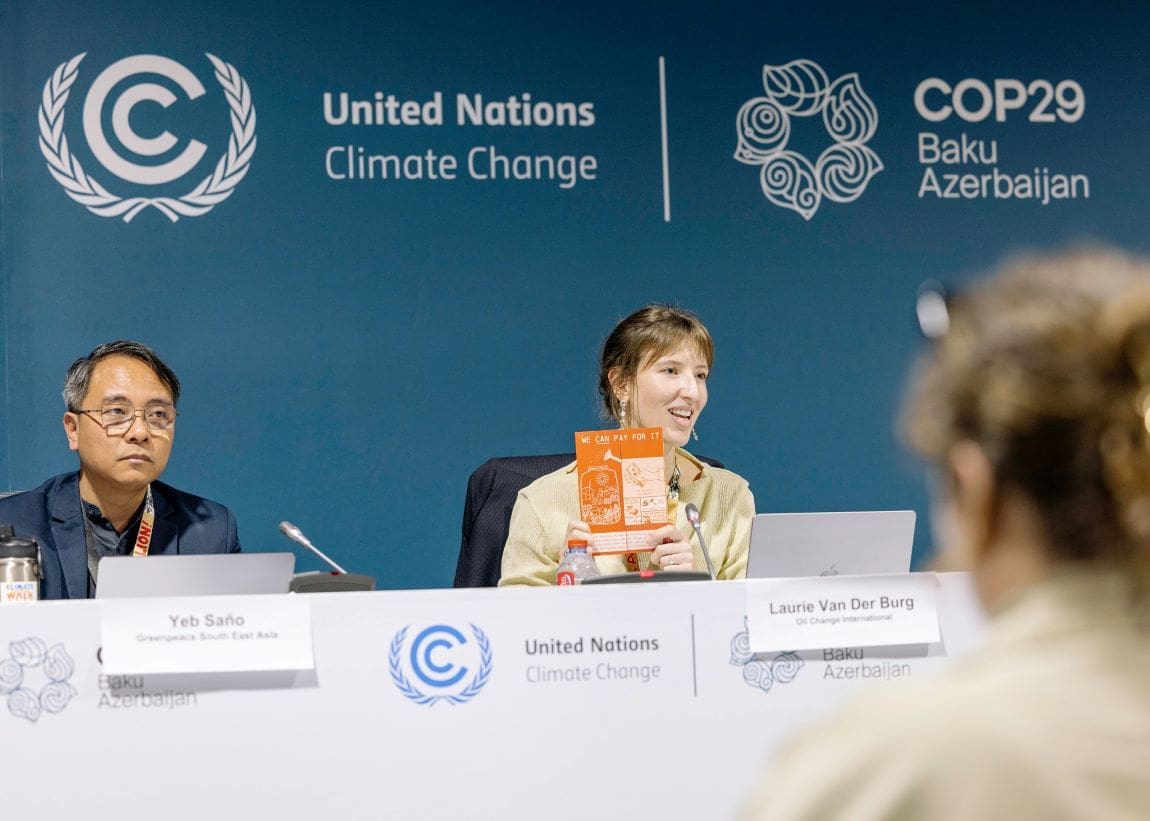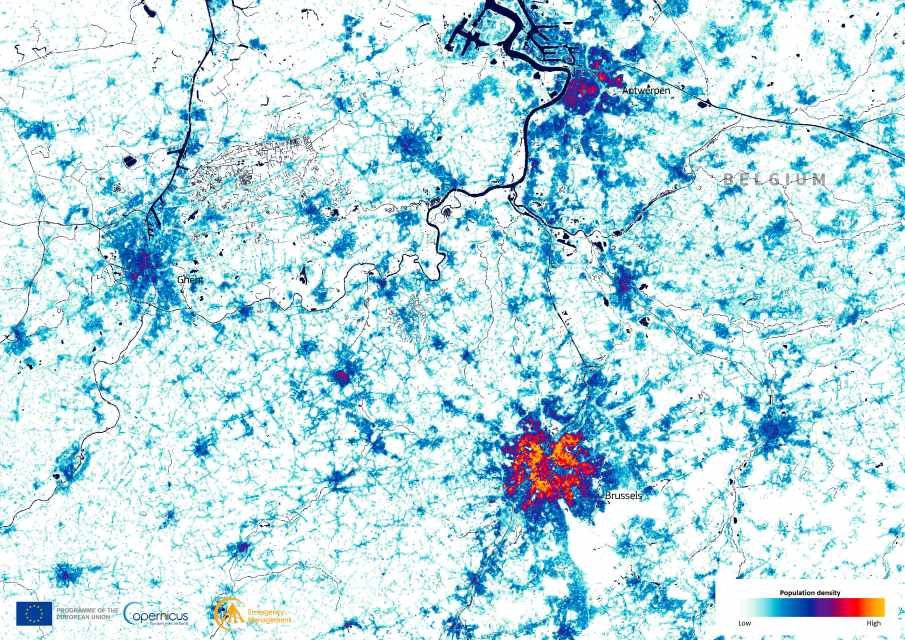Baku | 350.org – Billed as the “Finance COP”, the UN climate talks fell short of expectations and needs. The most vulnerable countries, already bearing the brunt of increasingly severe climate impacts were forced to accept a token financial pledge to prevent the collapse of negotiations – a stark reminder of the persistent imbalance in global climate justice.
Developed countries committed just ‘at least $300 billion per year’ from a variety of sources – including public and private – a figure that risks deepening the debt burden for vulnerable nations who are already paying the price of the climate crisis. High-income countries, responsible for the bulk of historical emissions, owe trillions to nations shouldering the costs.
Andreas Sieber, Policy Lead at 350.org, said:
“In Baku, we saw the future of our planet and the dignity of countless lives diminished to the minimum, a concession to wealthy governments determined to evade their moral and financial responsibilities. What was presented as progress was, in reality, the lowest common denominator.
Rich nations, led by the EU, USA, and Japan, failed to rise above this mediocrity, neglecting their historical responsibility. Their reluctance to prioritize ambition and equity leaves the most vulnerable without meaningful protection for their rights, lands, and future. The failure of this agreement underscores a troubling truth: those with the greatest capacity to lead continue to fall short when it matters most.”
Climate impacts alone cost developing countries hundreds of billions, without counting the added costs of adaptation and a just equitable transition to renewable energy.
This failure on behalf of rich countries exposes not only a lack of ambition, but a troubling erosion of trust, as they once again sidestep their moral responsibility and place profits over people, and allow fossil fuel companies to call the shots.
If there’s a silver lining to be found, it’s that while COP29 didn’t deliver the ambition sought, it at least concluded with countries recognizing this goal as a starting point that needs to be revised in 2030 with a clear roadmap to mobilize more money. Now, the Brazilian COP30 Presidency must take on the crucial task of leading a credible process to scale up finance and ensure its quality and impact.
Meanwhile, during a meeting organized by civil society organizations at COP29 in Baku, the climate justice movement pledged to maintain efforts to progress action on climate.
Namrata Chowdhary, Head of Public Engagement at 350.org, said:
“Once again, inequity has driven a hard bargain that the vulnerable have no choice but to accept. Rich countries have failed to honor their responsibilities, and shown up with rigid unwillingness to meet this moment with the ambition required to address the climate crisis.
As this deal gets pushed through in this dark, disappointing moment, we continue to stand in solidarity with those most impacted by both – a crisis they did not cause, and a result they could not influence. This deal has failed to meet the ambition needed, but as we’ve seen over the past two weeks in the halls of the COP venue and the many actions held across the world, hope and ambition are alive and well in the climate movement.
We are already looking ahead, and preparing to build new momentum in the global movement for climate justice, with a wave of campaigns and mobilizations focussed on real solutions to the climate crisis.”
The lack of financial backing from rich nations continues to obstruct meaningful progress on adaptation and mitigation, particularly in regions hardest hit by climate impacts. Instead, greenwashing tactics such as global carbon markets and unproven technologies are being touted as solutions, but without adequate funding, they remain out of reach for the most vulnerable communities.
Rich countries continue to keep money locked away by enforcing austerity measures, signaling to their citizens that resources are too scarce to invest in public services, social security, or climate action – a false claim and one that blocks progress on the renewable energy transition.
As the G20 declaration hinted, taxing the ultra-rich, financial transactions, aviation, shipping, and extractive industries could raise trillions annually, unlocking critical funds for climate finance, bolstering public services, and driving healthier, more equitable, and sustainable communities.
The conclusion of COP29 comes at the end of a record-breaking year for climate impacts, with rising temperatures, floods, hurricanes, droughts, and wildfires destroying communities and ecosystems worldwide. Every fraction of a degree matters, and we cannot delay action on climate any longer if we are to keep the hope of limiting the global temperature increase to 1.5°C alive.
In the face of governments failing us, social movements are showing leadership and driving forward renewable energy solutions that are locally led and put communities first. Indigenous groups in Brazil are calling to co-lead the UN climate conference in Belém, the Brazilian Amazon, alongside Brazil next year, acknowledging that they are the guardians of our ecosystems and are leaders in climate solutions.
Meanwhile, civil society across the world has been taking to the streets demanding action from world leaders, holding the richest and most polluting individuals and companies to account, and demanding investment in renewable energy.
Ilan Zugman, Director for Latin America and the Caribbean at 350.org:
“After three years of UN climate talks being plagued by the fossil fuel industry, it’s time to correct the course. Next year’s COP in the Brazilian Amazon offers a unique opportunity to put people, climate solutions and affordable renewable energy front and center.
Indigenous people in Brazil are leading the way but we need the Brazilian government to follow suit. President Lula must step up as a true climate leader – kicking out fossil fuel interests and investments and ensuring the inevitable renewable revolution is led by communities – not corporations.”
Next year’s COP30 in Brazil is expected to see an unprecedented demonstration of solidarity and strength from Indigenous peoples, Small Island Developing States, Global South communities, and the international climate movement. In the wake of COP29’s failure to deliver, all eyes have turned promptly to Brazil as the next critical arena in which to fight for climate justice, human rights, and robust international cooperation.
Article Source:
Press Release/Material by 350.org | Source contact: [email protected]; Rachel Brabbins, [email protected]
Featured image credit: 350.org
Disclaimer:
This press release is not a document produced by Muser Press. Muser Press shall not bear responsibility for its content. In case you have any questions about this press release, please refer to the contact person/entity mentioned in the text of the press release.




